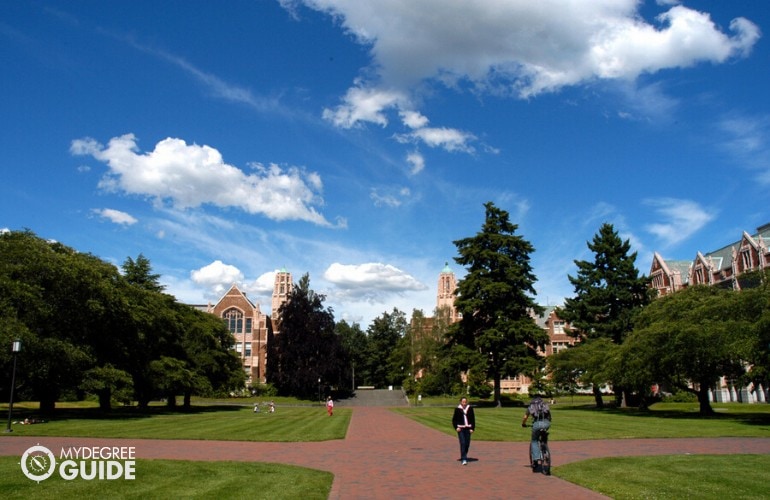Special education is a passion for many people, but if you want to distinguish yourself with the highest educational qualification of the field, then an online doctorate in special education may be the path for you.

Earning a doctoral degree is no easy feat, as it consists of several years of intensive coursework and either a dissertation or capstone project. While it does require great commitment and determination, many people find that the hard work is well worth it.
Editorial Listing ShortCode:
Let’s explore what it’s like to earn a doctoral degree online as well as how an EdD or PhD in Special Education can help you achieve your goals post-graduation.
Universities Offering Online Doctorate in Special Education Degree Programs
Methodology: The following school list is in alphabetical order. To be included, a college or university must be regionally accredited and offer degree programs online or in a hybrid format.
1. Ball State University
Ball State University offers a Doctorate in Education along with a Special Education concentration. There’s a general special education track as well as tracks in applied behavioral analysis and autism, high incidence and low incidence teaching and training, and emotional and behavioral disorders. The program is approximately 90% online.
Ball State is accredited by the Higher Learning Commission.
2. Capella University
The PhD in Education program at Capella University features a concentration in Special Education Leadership.
It includes 4 core courses and 10 specialization courses as well as a dissertation, 2 internships, and 3 residencies. Students learn about special education curriculum, instruction, community and family collaboration, financial resources, and laws and regulations.
Capella University is accredited by the Higher Learning Commission.
3. City University of Seattle
Students enrolled in City University of Seattle’s Doctor of Education in Leadership program can select concentrations from organizational leadership, higher education leadership, or specialized study.
The specialized study option opens many additional avenues of study tailored to fit students’ individual needs. The school also offers an endorsement in special education.
CityU is accredited by the Northwest Commission on Colleges and Universities.
4. Drexel University
Drexel University’s Doctor of Education in Educational Leadership and Management program features ten concentrations, including one in Special Education Leadership.
Its goal is to provide students with the skills, resources, and knowledge necessary to become special education program directors. Most students usually finish the program in 3 to 5 years.
Drexel University is accredited by the Middle States Commission on Higher Education.
5. Duquesne University
Students enrolled in Duquesne University’s PhD in Special Education program should learn a lot about social justice, early intervention, assessment, and curriculum design. It’s an 80 credit program that allows both full-time and part-time students to enroll. The program features further specializations in assessment and learning and autism and behavior.
Duquesne University is accredited by the Middle States Commission on Higher Education.
6. Grand Canyon University
Grand Canyon University’s Doctor of Education in Organizational Leadership program offers students a concentration in Special Education.
It’s a qualitative program that focuses primarily on research. The curriculum includes courses such as foundations of research design, qualitative data analysis, results and findings, designing a qualitative study, and special education law.
Grand Canyon University is accredited by the Higher Learning Commission.
7. Gwynedd Mercy University
Gwynedd Mercy University offers a quick and flexible way to earn a doctoral degree with its 54 credit, online, accelerated Executive Doctorate in Educational Leadership program.
Students can choose from four concentrations, including one in Leadership in Special Education. Focus is placed on educational research, teaching, curriculum development, and education policy.
Gwynedd Mercy University is accredited by the Middle States Commission on Higher Education.
8. Liberty University
Liberty University’s Doctor of Education in Curriculum and Instruction program includes a Special Education concentration for students hoping to become special education instructors or program directors, gifted student instructors, or school administrators.
The curriculum focuses on organization and design of gifted education programs, educational assessment, classroom management, and learning theory.
Liberty University is accredited by the Southern Association of Colleges and Schools Commission on Colleges.
9. National University
National University offers a PhD in Education with a Special Education specialization. The program is designed for special education professionals who work in a variety of settings and want to make significant scholarly contributions to the field.
The curriculum involves research and advanced study of topics such as educational equity, inclusion, educational leadership, and methods for monitoring student progress.
National University is accredited by the WASC Senior College and University Commission.
10. Nova Southeastern University
The Doctor of Education in Special Education program at Nova Southeastern University is specifically designed for current education professionals hoping to move into special education leadership positions.
The curriculum is diverse and comprehensive, and students can choose between giving traditional dissertations or completing strategic research projects to earn their degrees.
NSU is accredited by the Southern Association of Colleges and Schools Commission on Colleges.
11. Portland State University
Portland State University offers its educational leadership doctorate program 100% on-campus, 100% online, and in hybrid format. It features multiple specializations from which students can choose. One of these is the special education concentration. It’s main focus is on the leadership of agencies, schools, and communities serving people with disabilities.
Portland State University is accredited by the Northwest Commission on Colleges and Universities.
12. Regent University
Regent University’s Doctor of Education program is a Christian-oriented program designed to train 21st century leaders for every aspect of education.
There are numerous concentrations available, but students hoping to become special education leaders and directors can select the Special Education concentration to learn about special education policy, practice, and research.
Regent University is accredited by the Southern Association of Colleges and Schools Commission on Colleges.
13. Slippery Rock University
The Doctor in Special Education program at Slippery Rock University is for current educators and human service workers who want to transition into special education leadership positions. The degree requires 60 total credits for completion, but students can transfer up to 12 previously earned credits into the program.
Slippery Rock University is accredited by the Middle States Commission on Higher Education.
14. St John’s University
Although St. John’s University doesn’t offer a doctoral degree in special education, it does offer a PhD in Literacy with an optional TESOL and Bilingual Education concentration. This degree can lend itself nicely to careers in special education because of its foundations of literacy and special topics in literacy courses.
St. John’s University is accredited by the Middle States Commission on Higher Education.
15. Texas Tech University
Students in Texas Tech University’s PhD in Special Education program should be prepared for careers as consultants, specialists, teachers, and researchers. The curriculum adheres to the code of ethics put in place by the Council for Exceptional Children and requires 90 credits for completion. Currently, GRE scores are being waived.
Texas Tech University is accredited with the Southern Association of Colleges and Schools Commission on Colleges.
16. University of Alabama
The University of Alabama offers an online Doctor of Education in Special Education with specialized tracks in Leadership, Autism, Collaborative, and Gifted. New sessions begin every fall. The program requires 72 credits, including both coursework and a dissertation. Courses may be synchronous or asynchronous.
The University of Alabama is accredited by the Southern Association of Colleges and Schools Commission on Colleges.
17. University of Colorado – Denver
University of Colorado – Denver’s Doctor of Education in Leadership for Educational Equity program is a special education doctoral degree focused specifically on early childhood learners.
Graduates should understand the issues surrounding inclusive early childhood education, advocate for children with disabilities and diverse abilities, and become effective leaders in the field.
The University of Colorado – Denver is accredited by the Higher Learning Commission.
18. University of Florida
The Doctor of Education in Special Education program at the University of Florida seeks to educate participants in all matters of special education. Students learn to advocate for individuals with disabilities, serve as school leaders and service providers for these individuals, and communicate and work collaboratively with the individuals’ families.
The University of Florida is accredited by the Southern Association of Colleges and Schools Commission on Colleges.
19. University of North Dakota
University of North Dakota’s Doctorate in Education in Educational Practice and Leadership is a 100% online program designed for working educational professionals. The degree takes about 3 years to complete, and there’s a Special Education concentration. Most of the courses in this concentration focus on the field of educational diagnostics.
The University of North Dakota is accredited by the Higher Learning Commission of the North Central Association of Colleges and Schools.
20. University of Northern Colorado
The University of Northern Colorado offers a PhD in Special Education that’s flexible and allows students to customize their courses based on their interests and skills.
The program puts a strong focus on evidence-based practice, research methodology, pedagogy, public policy, collaboration, and educational theory. The school doesn’t charge out-of-state tuition.
The University of Northern Colorado is accredited by the Higher Learning Commission.
21. University of Pittsburgh
University of Pittsburgh offers both a Doctor of Education in Special Education and a PhD in Special Education. The PhD program focuses more on the actual education of students and covers topics like early intervention and education of students with mental and physical disabilities. The EdD in Special Education program is more research-based.
The University of Pittsburgh is accredited by the Middle States Commission on Higher Education.
22. University of Southern Mississippi
The PhD in Education with a concentration in Special Education program at the University of Southern Mississippi requires 66 credits for completion and meets Mississippi state standards for advanced licensure. There are several qualitative research and quantitative analysis courses in the curriculum as well as courses specific to special education.
The University of Southern Mississippi is accredited by the Southern Association of Colleges and Schools Commission on Colleges.
23. University of Toledo
University of Toledo’s Doctorate in Curriculum and Instruction program features a Special Education concentration that focuses on turning educators into special education leaders and directors. It’s a rigorous, 60 credit program that usually takes between 4 and 5 years to finish. Students will participate in several virtual internships as well.
The University of Toledo is accredited by the Higher Learning Commission.
24. University of West Georgia
University of West Georgia’s Doctor of Education in School Improvement program features nine different concentrations as part of its program.
Students who choose the Special Education concentration will take courses in autism instruction and collaboration, autism characteristics and theory, administrating special education programs, special education law, and program planning and evaluation.
UWG is accredited by the Southern Association of Colleges and Schools Commission on Colleges.
25. Walden University
Walden University’s Doctor of Education in Special Education program requires 79 quarter credits, one face-to-face residency, and a doctoral writing assessment to complete.
Graduates are expected to be able to evaluate the ethical and legal merits of policies surrounding special education, implement assessments and interventions, and evaluate special education programs.
Walden is accredited by The Higher Learning Commission.
Special Education Online Doctoral Programs

Achieving a doctoral degree should make you an expert in the field of special education. This could lead to a variety of career paths, including administrative roles in school systems or higher education, research roles for private organizations, and leadership roles for human services agencies.
In a special education doctoral degree program, you will take advanced courses on disabilities and how they affect a student’s education as well as courses on educating gifted students.
Research is also a major focus for a doctoral program. You will likely take statistics and qualitative research courses, which will help prepare you for your dissertation or capstone project of your program.
Research courses will also give you the tools you’ll need to contribute new ideas and information to the body of special education research. These tools will also assist you in staying current in the field throughout your career.
Because there are many laws that impact education, you can also expect to take courses on educational law. This will help you be well-versed on the various methods that comply with the laws of today and of the future.
Special Education Careers & Salaries

A doctoral degree in special education online can lead to many worthwhile careers, including leadership, teaching, or research roles in school systems, higher education, or other organizations.
With this online education degree you could train the next generation of teachers in an education program at a college or university. You could also become an administrator in higher education, potentially leading and directing student success and accessibility departments.
If working in K-12 schools is your goal, then a doctoral degree along with teaching experience would leave you qualified to be a school principal, curriculum designer, or special education department supervisor.
Once you have leadership experience in K-12 education, then you may qualify you to become a school superintendent, a role with great responsibility and high earning potential.
According to the Bureau of Labor Statistics, there are many occupations in the educational field for which someone with a doctoral degree would be qualified.
| Careers | Annual Median Salary |
| Elementary, Middle or High School Principal | $98,490 |
| Postsecondary Education Administrator | $97,500 |
| Postsecondary Teacher | $80,790 |
| Instructional Coordinator | $66,970 |
| High School Teacher | $62,870 |
| Special Education Teacher | $61,420 |
| Middle School Teacher | $60,810 |
| Kindergarten or Elementary School Teacher | $60,660 |
| Career and Technical Education Teacher | $59,140 |
| Adult Literacy Instructor | $55,350 |
While some of the occupations listed here may only require a bachelors or masters degree in special education, a doctoral degree in special education would prepare you for many career paths as an educator, leader, or researcher of special education.
Some of the most common careers for someone holding this degree include school principal, school instructional coordinator, and college or university administrator or professor. You could also work as a leader in an allied human services organization.
There are many occupations that highly value any doctoral degree such as an online doctoral degree in higher education, especially in K-12 and postsecondary administration, so your career path would be uniquely your own.
Choosing an Online Doctorate in Special Education
There are many factors to take into account when choosing a degree program, including cost, time to completion, student to faculty ratio, accreditation, and university reputation.
Here are some special considerations for choosing your online doctorate program in special education:
- Admission requirements: Some doctoral programs are designed for students with only a bachelor’s degree while others require applicants to already hold a master’s degree. Some programs also expect students to have work experience in the education field.
- Length and design: Many online programs are designed for those working full-time, allowing part-time coursework and flexibility in how long it takes to complete the degree. Other online programs are tailored to full-time students who want to complete the program as quickly as possible.
- On-campus requirements: There are 100% online EdD and PhD in Special Education programs, but some universities offer all of the coursework online and still require a few visits to the university campus for dissertation proceedings, when applicable, or intensive seminars.
Every program is different, so it’s important to find the right program that will meet your specific needs, especially since a doctoral program is a great investment of your time and money.
Doctoral Curriculum & Courses

There are many fascinating courses that you will take in an EdD or PhD in Special Education program that will cover laws, disabilities, education, and research. Here are some courses typical of a doctoral degree program in special education.
- Education of Exceptional Children: This course focuses on the needs and psychology surrounding the education of gifted students.
- Law of Exceptionalities: This course typically looks at current laws impacting education in addition to the tools educators will need to understand, interpret, and comply with new laws.
- Law and Higher Education Issues for Students with Autism: This course looks into the legal requirements, in particular the Americans with Disabilities Act (ADA), affecting colleges and universities’ education of students with disabilities and autism and the effective higher education policies on educational support, accommodations, and inclusivity.
- Special Education Policies and Issues: This course will cover social factors affecting people with disabilities, legal requirements of special education, and incorporating community resources.
- Emotional and Behavioral Disorders: An advanced course on the disorders affecting students’ emotions and behavior will look at proven teaching methods, treatment strategies, causes of the disorders, and types of disorders.
- Applied Behavior Analysis: A course on behavioral analysis will typically cover how to conduct an initial assessment of student behavior, determine the most appropriate interventional strategy, assess whether the intervention had a positive effect, and ensure that the positive effects remain in place.
- Introduction of Qualitative Research: Research methods are a major focus in doctoral programs, and a course offering guidance on the many types of qualitative (non-numerical) research will be valuable for educational leaders.
- Research in Special Education: Focusing on methods to conduct effective secondary and tertiary research (rather than primary research), this course will help students hone their skills in finding and analyzing existing data and research.
- Advanced Research Methods: This course will take a deep dive into all research methods and the ways to design studies.
- Grant Writing: A course on grant writing for educators will cover finding grant opportunities, methods for developing grant proposals, and assessing grant outcomes.
Doctoral-level special education courses are incredibly valuable because they teach practical skills, offer knowledge essential for educational leaders, and prepare educators to adapt to new laws and develop better teaching practices.
Admissions Requirements
Most universities have fairly standard admissions applications.
Here are a few components of an application that you should expect to be requested:
- Statement of Goals: Doctoral programs often look for goal-oriented students who are committed and driven to successfully complete the program, so an essay detailing your professional goals and how the degree will allow you to accomplish them is usually required.
- Bachelor’s and Master’s Degree Transcripts: Official transcripts from the college or universities where you earned your bachelor’s degree and master’s degree (if required for admission) are needed.
- Writing Sample: Some programs require a sample of writing you completed for a previous academic program to assess your strengths in writing and research.
Other components of a doctoral degree program admissions application that you might encounter, depending on the institution, include recommendation letters, GRE or GMAT scores, and sometimes an admissions interview.
Accreditation

When choosing a doctoral degree program, it is important to find out if universities you’re considering are accredited by a regional accrediting organization.
To be accredited, a college or university must prove that they are meeting their mission through their programs and services and maintaining academic rigor and integrity. To prove this, institutions must engage in a consistent process of self-assessment and continually seek to improve themselves.
Accreditation often speaks to the quality of a college or university. Because doctoral programs are such an investment of time and funds, you may want to make sure that the university you choose is well-respected.
Financial Aid and Scholarships

Student loans are usually available for doctoral students who qualify. Students seeking these opportunities will need to complete the Free Application for Federal Student Aid (FASFA).
Your chosen university may also have scholarships and grants available that you may be eligible to apply for. Unlike a loan, grants and scholarships do not need to be paid back, so they are the most cost-effective funding opportunity to inquire about.
Many graduate students find that they are able to fund their education through a mix of loans and scholarships or grants. Cost and funding are important factors to consider when choosing your degree program, so it’s always advisable to inquire about funding opportunities early on in the admissions process.
What Can You Do with a Special Education Doctorate?

A doctoral degree in special education can prepare you to be a leader in the education field. You may qualify to be an administrator, teacher, professor, or researcher.
In a school system, you may be a school principal, curriculum designer, or special education department supervisor. In higher education, you may be a professor or administrator of academic or student affairs.
Your career may also lead you to a position as an educational researcher for a private organization or to a leadership position at a human services nonprofit.
How Much Does an Online PhD in Special Education Cost?

Although tuition rates vary, you can expect to pay between $450 and $595 per credit hour when pursuing a doctorate in special education.
Cost and how you can fund your degree are always critical factors to consider when selecting your degree program. It’s advisable to complete the FAFSA and ask your university about scholarships or grants.
A doctoral degree is an investment in yourself that may be reflected in your career, earning potential, and personal fulfillment. It’s important to weigh the cost of the degree against the potential rewards of successfully completing the program.
How Long Does It Take to Get a PhD in Special Education?

A doctoral degree is a significant time commitment because it prepares students to be experts in their field, requiring much training and preparation.
EdD and PhD programs typically require 60 to 90 credits of coursework, including either your dissertation or capstone project, and usually take 3 to 5 years to complete. If you already have a masters degree in education, you may have the opportunity to transfer in credits, shaving some time off of your doctoral degree.
Some programs require applicants to hold a masters degree and may require fewer credits than programs designed for students with a bachelor’s degree only. So there is variance among programs in terms of credit requirements and time to completion.
What’s the Difference Between an EdD vs. PhD in Special Education?

While different in overall focus, EdD and PhD programs will be similar in their course offerings because students in both programs need to have a strong base of knowledge in special education.
An EdD in Special Education online program is focused on preparing students to be practitioners in the special education field. The program prepares people to work directly in the field for a school or institution of higher education, identifying and solving problems to make their services better.
While the PhD may also qualify you to be an educator or educational leader, a PhD in Special Education online program is more focused on conducting research in order to drive new information to the field. Someone holding a PhD might conduct the research that will inform the practical decisions made by those in leadership roles in education.
Most PhD programs still require a dissertation. When it comes to EdD programs, though, students are often given the option of completing a capstone or similar final project in lieu of a dissertation.
Is a Special Education Doctorate Worth It?

Yes, a doctorate in special education is worth it for many students. According to the Bureau of Labor Statistics, education, training, and library jobs are set to grow at 5% over the next 10 years, faster than the average for all occupations.
Common careers for someone holding a doctorate in special education include school principal, instructional coordinator, special education department supervisor, college or university professor, and higher education administrator.
There are many benefits to a leadership role in special education. With a doctoral degree, you will gain the research, problem-solving, and teaching skills necessary to lead the field in directions that will have positive impacts on a wide array of learners.
Getting Your EdD or PhD Online

If special education is your passion and you want to be a thought-leader in the field, then an EdD or PhD in Special Education may be the right path to consider. Even if you have work or family obligations that prevent you from attending a traditional program, there are regionally accredited programs that offer the convenience of a 100% online degree.
Special education is an incredibly important field that is in need of leaders who are strategic and innovative. By obtaining a doctorate in this field, you may have a positive impact on many students’ lives through research and policy.
